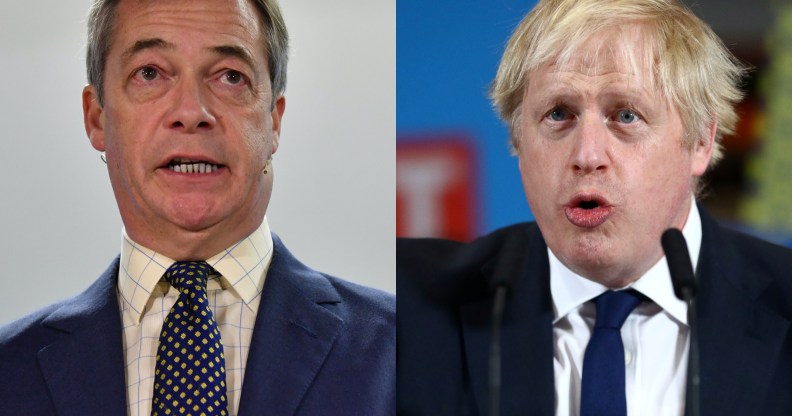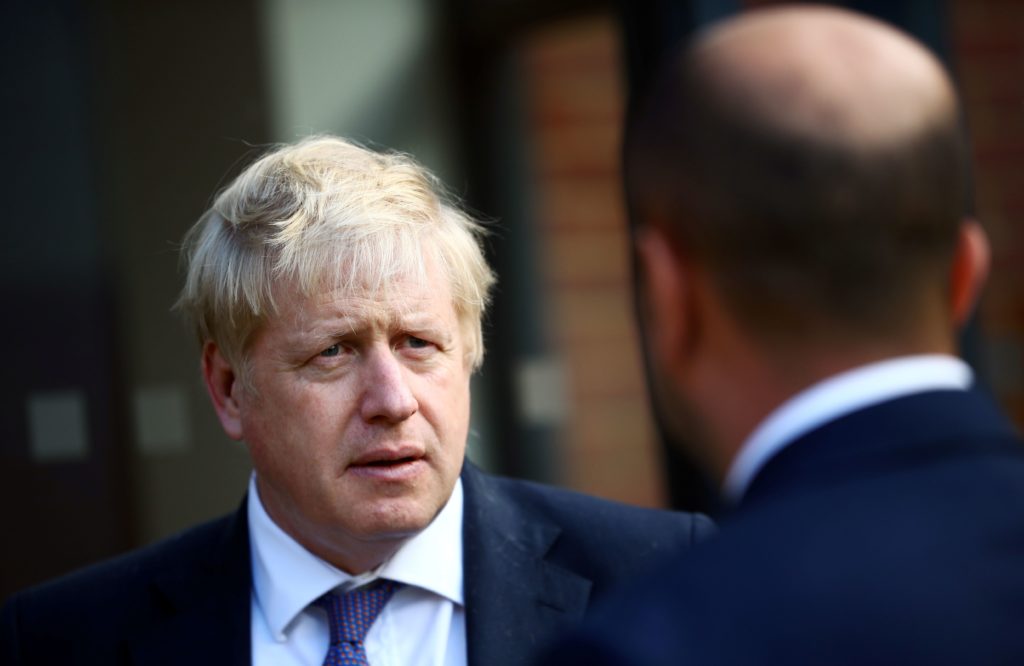To the surprise of literally nobody, Nigel Farage just defended Boris Johnson calling gay men ‘bum boys’

Nigel Farage (L) has sought to defend prime minister Boris Johnson amid continued calls for him to apologise for derisory language used in his journalism. (PAUL ELLIS/AFP via Getty Images/Hannah McKay – WPA Pool/Getty Images
The Brexit Party leader Nigel Farage defended British prime minister Boris Johnson’s use of homophobic, racist, sexist and Islamophobic terms during a radio interview today.
During a question and answer segment on BBC Radio Five Live this morning, the lawmaker excused comments made by Johnson during his stint as a journalist in the 90s and 00s.
The Conservative leader’s journalistic career has been caught in the firing range from activists during the upcoming general election, but despite several opportunities to apologise, Johnson has repeatedly veered away.
Farage, 55, insisted that the use of terms such as “tank-topped bum boys” is simply part of the ‘Boris Brand’.
Boris Johnson used homophobic terms as he’s a ‘very outspoken journalist’, Nigel Farage says.
As host Nicky Campbell grilled Nigel Farage on climate catastrophe and trade talks, he brought up the former mayor of London’s “use of language, ‘bum-boys'”.
“Look,” the former UKIP leader said, “Boris is a guy who has earned his living being a very outspoken journalist and that’s why he uses phrases like that.
“He talks about letterboxes, other things.”
These “phrases” that Farage suggested are part and parcel of journalism include but are not limited to:
- Referring to low-income workers as “chavs, losers and burglars” in the Telegraph in 2005.
- Labelling the children of single mothers “ill-raised, ignorant, aggressive and illegitimate,” while their fathers are too “feeble” to “take control” of their “woman” in The Spectator in 1995.
- Calling women “emotional”, typically being “blubbing blondes” or “collapsing with emotion” in the Daily Telegraph.
- Comparing same-sex marriage to bestiality and will usher in marriage between “three men and a dog” in his 2001 book, Friends, Voters, Countrymen.
- Discussing Peter Mandelson’s resignation from the Labour Government in 1998 in a Telegraph column as leading to the blobbing of “tank-topped bumboys” in “the Ministry of Sound” nightclub, and the “soft-lit Soho drinking clubs frequented by Mandy and his pals.”
- Writing in an article in the Telegraph in 2002, he referred to African people as having “watermelon smiles”.
- He also compared Muslim women who wear burqas to “letter boxes” and bank robbers for the Telegraph in 2018.
Campbell then enquired whether the lawmaker believed that “picaninnies”, which Johnson used in an article referring to people of colour, was “acceptable”.
“It’s not very pretty, but that’s Boris,” Farage responded.
“As I say, he earns his living being a controversial journalist.
“I may not approve of all of it but I also think that if we start to go down the road of saying people saying this or that is unacceptable, if we want to bar him from public life because of some of the unsavoury things he’s written, then I think we might finish up with nobody in public life at all.”
Boris Johnson claims comments were only ‘made to seem offensive’.
While angling to become prime minister earlier this year, opponents of Johnson’s harnessed his parade of right-wing classics in an effort to derail his leadership campaign.
But the lawmaker constantly dodged calls for him to apologise for using such jibes, calls which have carried into his premiership and current election campaign.

Britain’s prime minister Boris Johnson. (HANNAH MCKAY/POOL/AFP via Getty Images)
Only recently, he said that these phrase were only “made to seem offensive” and defended his “right to speak out”.
Moreover, Plaid Cymru leader Adam Price hit out at Johnson, saying that his use of such slurs makes him “unfit for public life”.
During a live television debate, the first openly gay leader of a major UK political party said Johnson is “creating the climate where abuse becomes acceptable.”

